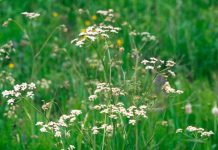The drink, which is well known to all of us, black tea, is drunk in the family circle, at social events and in any cafe. Its usefulness and taste have conquered humanity for many hundreds of years.
Material Content:
- 1 Black tea - chemical composition and calorie content
- 2 What are the varieties?
- 3 How to brew and drink a tea drink?
- 4 The benefits of black tea for men and women
- 5 The effect of black tea on blood pressure
- 6 Which tea is healthier - black or green?
- 7 Can I drink black tea during pregnancy and lactation?
- 8 Black tea with milk: benefits and harms
- 9 Use of beneficial properties in cosmetology
- 10 Contraindications and harm from drinking strong tea
Black tea - chemical composition and calorie content
It would seem that such a popular drink should be studied along and across. But no. All the constituents and useful properties of tea are not open until now. But people do not cease to be surprised at the open properties of tea.
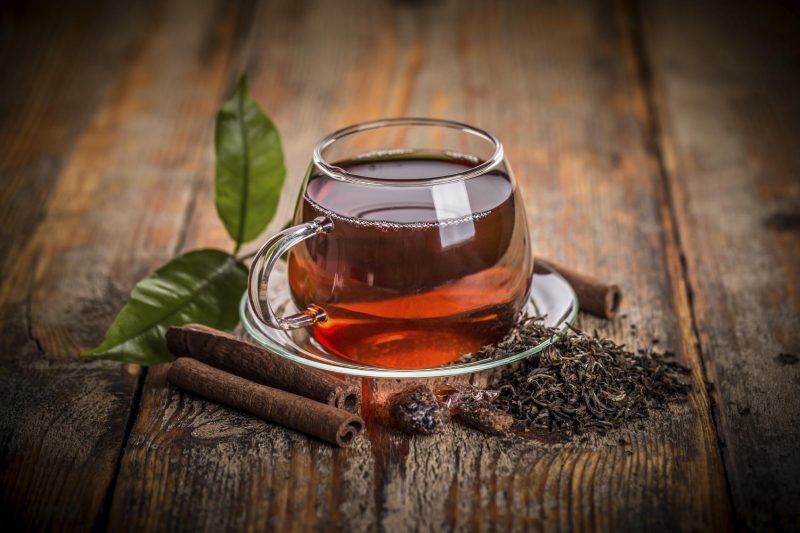
The composition of tea leaves includes:
- up to 30% tannins. They help suppress inflammation in the body, improve blood circulation. A popular representative is tannin. There are several dozen of them. Tannin gives tea a tart flavor;
- vegetable proteins;
- amino acids. Contribute to the restoration of the body during stress and nervous overload;
- about 5% caffeine, which provides a psychostimulant effect on the body. Caffeine in tea is sometimes called thein. Thein is an alkaloid. It dilates blood vessels, stimulates platelet aggregation and accelerates the pulse. The amount of thein in tea depends on several factors: the type and quality of tea leaves, the type of fermentation of the raw material;
- essential oils. Give tea drinks a unique flavor. The most popular are lemon and bergamot oil. They increase efficiency and immunity. And black tea with thyme helps with colds, diseases of the urinary and cardiovascular system;
- carbohydrates are simple and complex sugars. They are in good grade tea up to 2%. With a decrease in the quality of tea raw materials, the amount of sugar in the drink increases;
- various vitamins (provitamin A, B vitamins, vitamin P, C, K);
- minerals (potassium, zinc, magnesium, calcium, copper, iron, manganese).
It is interesting: bergamot - what is this plant
Black tea is low in calories. In 100 g of dry tea leaves, the concentration of calories is close to zero. The main calorie content of tea is given by additional components - fruits, herbs, milk, sugar or honey.
What are the varieties?
Many types of tea drinks are known. Specifically black tea more than 100 types for sure. The classification of tea drinks is divided into several groups, depending on various factors.
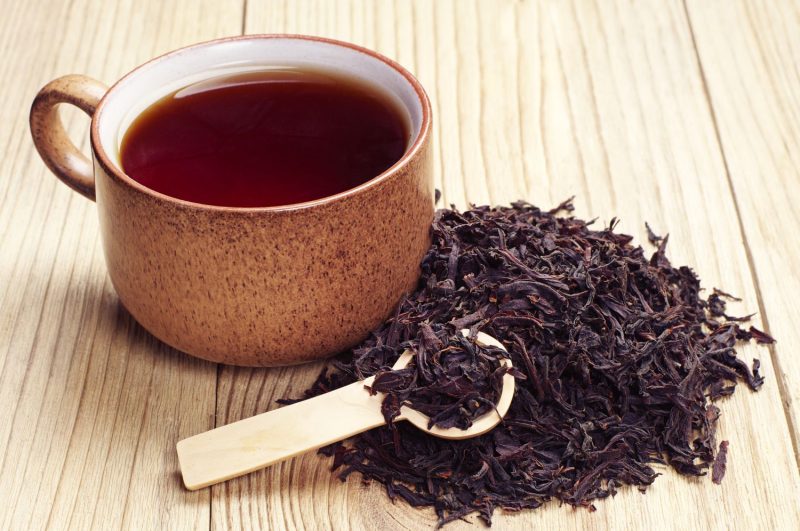
Classification of black tea by origin
| Chinese | Ceylon | Indian | African |
|---|---|---|---|
| It is made from the Chinese variety of plants. Thanks to modern technology, you can get a different form of tea. 25% of world tea supplies are from China. | It is made on the island of Sri Lanka. The best varieties are those that were grown in the highlands in the southern part of the island. | It has a pronounced taste. The intensity of the aroma is inferior to Chinese varieties. One of the elite varieties - Darjeeling, is a Chinese variety, but is grown on the slopes of the Himalayas. 10% of global tea supplies from India. | The largest supply of tea from Kenya. It is there that elite varieties are grown. Raw materials from other regions (Zimbabwe, Cameroon, Mozambique) are inferior to Kenyan tea in quality. The raw materials have good extractability, but the taste is sharp. Therefore, it is mixed with Ceylon. |
Russia produces its own variety of tea, Krasnodar, in small volumes. It is used only for internal use in the Russian Federation. There are inexpensive types of tea, and elite varieties (white, yellow).
General classification of tea
| By type of tea bush | In shape | Modern forms of tea leaves |
|---|---|---|
| 1.Chinese varieties. These include Japanese, Darjeeling, Chinese, Indonesian, Vietnamese; 2. Assam varieties: Ceylon, Indian, Kenyan; 3. The Cambodian variety is a hybrid of the two previous groups. | 1. Bayhovy (loose). It happens sheet, broken and small; 2. Pressed. It happens tiled, preformed, brick; 3. Soluble (extracted). It has 2 forms: crystals and liquid extract. | 1.Granular; 2. In bags; 3. In capsules for coffee machines; 4. In sticks. |
How to brew and drink a tea drink?
In some countries (for example, China and Japan) the use of tea has become a real ritual action. Tea was not just drunk, but a special ceremony was held, during which they gave appropriate honors to the healing drink. In the modern world, the process of drinking tea has been greatly simplified, it is enough to brew, add sugar to taste and drink hot.
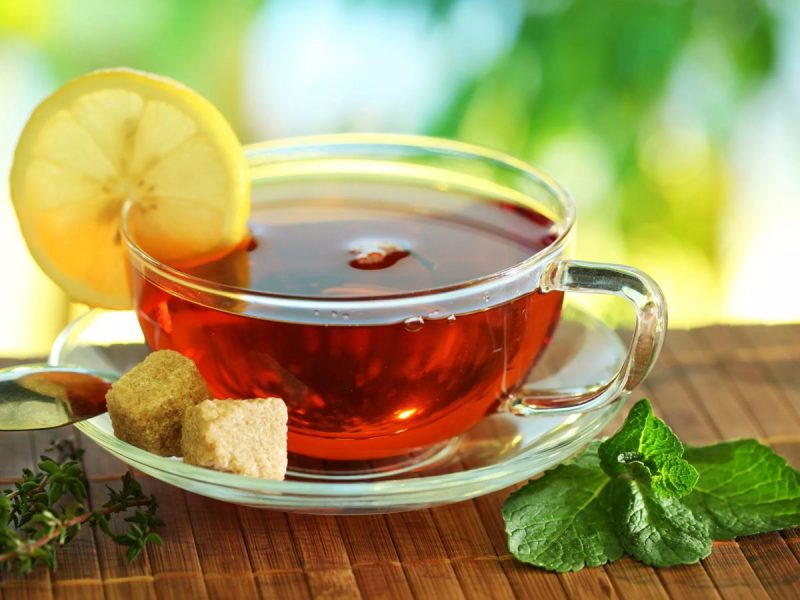
To make black tea with lemon and sugar you will need:
- boiling water - 200 and 500 ml;
- 2 teaspoons black leaf tea;
- a slice of lemon;
- sugar to taste;
- teapot, mug and spoon.
Cooking:
- Pre-brew a teapot with boiling water and pour tea leaves.
- Pour the leaves with 200 ml of boiling water, after a few seconds drain the water. Such manipulation allows the aroma and taste to fully reveal.
- Pour the leaves again with a second portion of boiling water. Insist for 7-10 minutes.
- Pour the finished tea into small circles. If the drink is too strong, in addition it can be diluted with boiling water directly in the mug.
- Add lemon and sugar to taste. Sugar can be replaced with honey. But first you need to wait for the tea to cool. When interacting with boiling water, honey loses its antioxidant and firming properties.
The benefits of black tea for men and women
The benefits of black tea are invaluable for both sexes.For both men and women, quality black tea is a source of vitality and nutrients. What is the drink useful for?
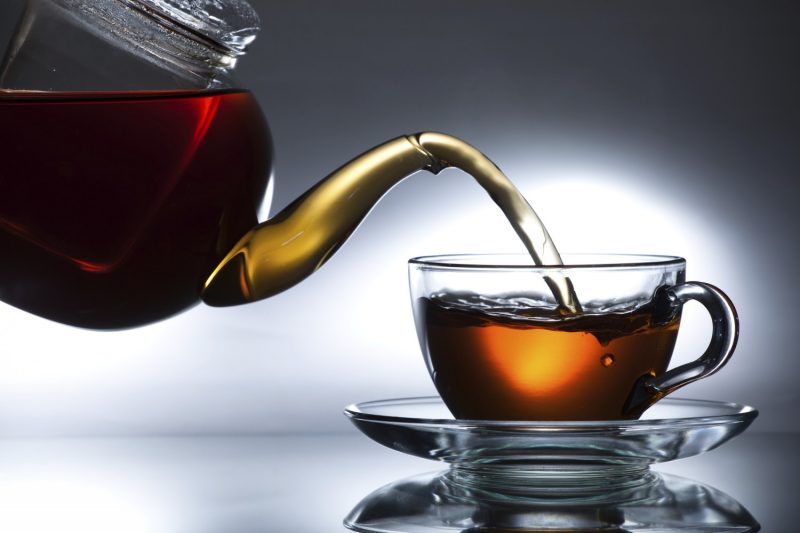
The components of tea leaves have a beneficial effect on the male body:
- tannin will remove heavy metals and toxins from the smoker's body;
- potassium contributes to the set of muscle mass in an athlete;
- phylloquinone will calm the nervous system after a hard day's work;
- amino acids will improve cerebral circulation and increase brain activity;
- tocopherol (vitamin E) will have beneficial effects on the work of the reproductive organs;
- thein will have a slight stimulating effect and increase potency;
- carbohydrates fill every cell of the body with vital energy.
The female body will also find what to draw from tea:
- antioxidants slow down the aging process;
- tocopherol will improve the work of the reproductive organs and contribute to conception;
- the torus will provide the beauty of a smile;
- vitamins and minerals enrich hair, nails and skin. Will make them strong and radiant;
- nicotinic acid and calcium will help lose weight.
Do not rely on the miraculous power of tea bags. Most often they contain a scanty amount of useful components. All value is in black large-leaf tea, especially in its elite varieties.
The effect of black tea on blood pressure
Many are interested in raising or lowering the pressure of a tea drink? The alkaloids that make up tea (caffeine or thein) have the ability to increase blood pressure.
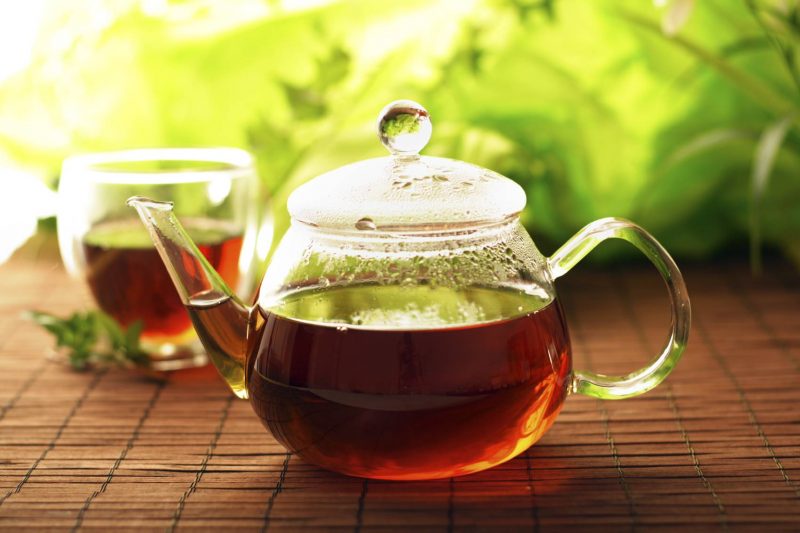
The action of this drink on the circulatory system is divided into 2 stages:
- Shortly after drinking tea, caffeine can increase blood pressure. There is an increase in heart rate. Some note mild arousal of the nervous system. This is the first stage of exposure.
- At the second stage, pressure is maintained at elevated levels. That is, tea alkaloids help maintain pressure without taking any pharmaceuticals.
It turns out that black tea is the best way to normalize pressure in hypotensive patients. He is able not only to increase pressure when necessary, but also to keep it normal throughout the day.
Which tea is healthier - black or green?
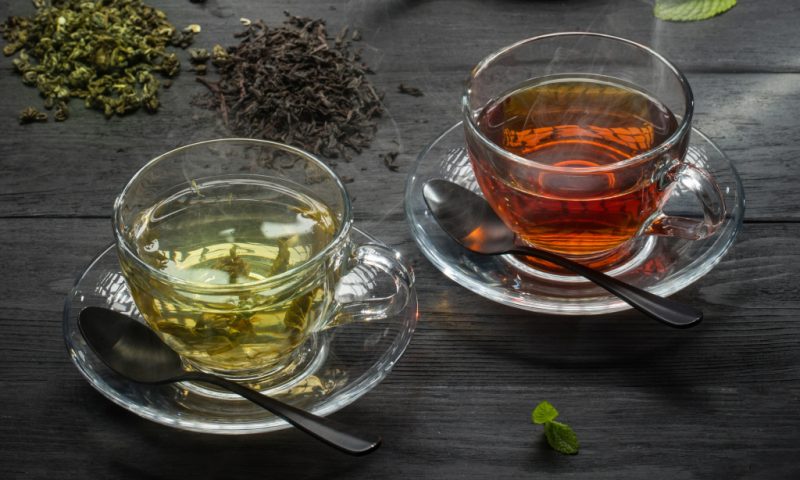
For quite some time, tea supporters have divided into 2 camps: black lovers and green drink lovers. And each camp proves that it is his tea that is the most wholesome and delicious. To say with 100% certainty what kind of drink is better is not possible. It all depends on the variety and type of tea leaf itself.
Let's try to compare these two types of drink in the table.
| Features | The black | Green |
|---|---|---|
| Taste | Tart bitter taste. Some varieties have a touch of honey or flowers. | Refreshing herbal flavor. |
| Fermentation susceptibility | It is subjected to chemical fermentation (oxidation) for a long time. | Practical not subject to fermentation. |
| Beneficial features | • astringent; • antimicrobial; • antioxidant; • exciting; • energy supply. | • enriches the body with antioxidants; • has a large amount of caffeine in the composition; • beneficially affects the whole body as a whole. |
| Does it have contraindications? | Both types of tea drink have certain contraindications. | |
| What can be combined with? | Mint, lemon, thyme, fruit, hibiscus, oregano, wild rose, berries, medicinal herbs, milk, spices and spices. | Mint, jasmine, thyme, lemon, lemongrass, berries, fruits, milk. |
| Cost | The cost of tea of a budget category does not differ too much. All types of drinks vary depending on the varieties and additional components. |
Can I drink black tea during pregnancy and lactation?
Medical experts on this issue do not agree. Adherents of Soviet medical methods argue that warm milk tea can significantly increase lactation.There is no scientifically substantiated evidence for this hypothesis. Any warm drink taken orally can increase the amount of milk produced.
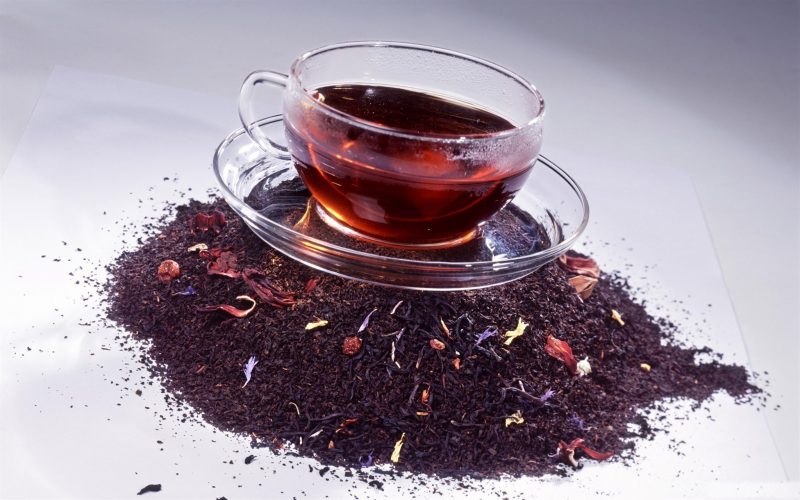
Modern medicine believes that a pregnant and lactating woman should temporarily refrain from drinking caffeinated drinks. This component is able to penetrate the placental barrier in the perinatal period, getting into the baby's blood. Also, caffeine is able to penetrate the body of a child with mother's milk.
It does not affect the child’s body in the best way:
- when drinking tea at an early age, allergic rashes may occur. But most often they arise in response to supplements (herbs, fruits, extracts and others);
- the baby becomes moody, whiny and restless;
- having trouble sleeping. When it comes time to sleep, the baby cries and gets nervous. This indicates the sensitivity of the child's body to thein;
- in rare cases, digestive system disorders (nausea, diarrhea, abdominal pain) occur.
Black tea with milk: benefits and harms
They came up with milk tea in England. This drink is considered traditional English.
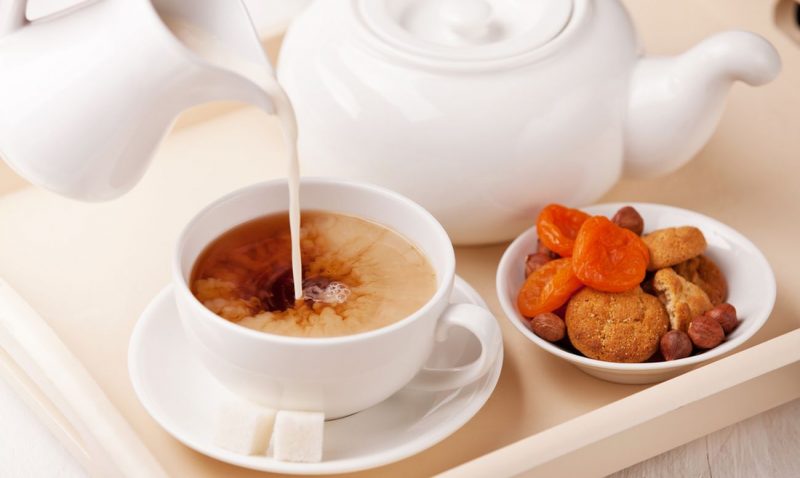
The benefit from it is quite large:
- the amount of nutrients from tea and milk together is easily absorbed by the intestines;
- milk drink helps with colds, restores vitality after illnesses;
- significantly improves the functioning of brain cells.
But tea with milk can also harm:
- Do not drink food with a drink;
- do not use it for people with hypertension;
- do not drink it for pregnant women;
- it is impossible to drink medicines with milk tea, as this worsens their absorption in the digestive tract.
Use of beneficial properties in cosmetology
In cosmetology, a sufficient number of recipes using black tea and its extract are known. Tea procedures are used both in beauty salons and during home relaxation.
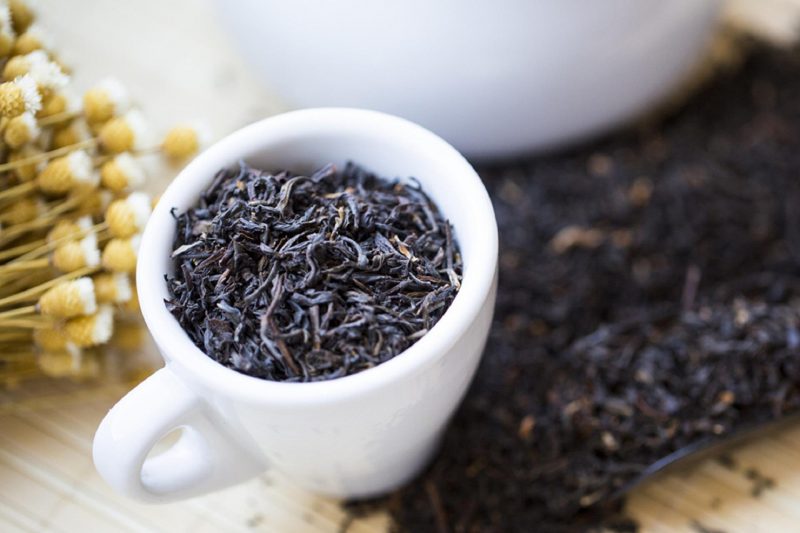
Compresses, decoctions and masks made of tea have a healing effect on the skin of the face:
- Smooth fine expression wrinkles.
- Eliminate dark circles under the eyes.
- They produce an anti-inflammatory effect, which is especially important for women with rashes.
- They are nourished with microelements and tone up the skin of the face.
- Align the overall tone.
Many cosmetologists recommend wiping your face daily with ice cubes with tea and decoctions of herbs. It can be tea with lemon balm, linden or mint. A good effect is rubbing the face with tea and scarlet.
Contraindications and harm from drinking strong tea
If you drink too much strong black tea, you can get significant health problems.
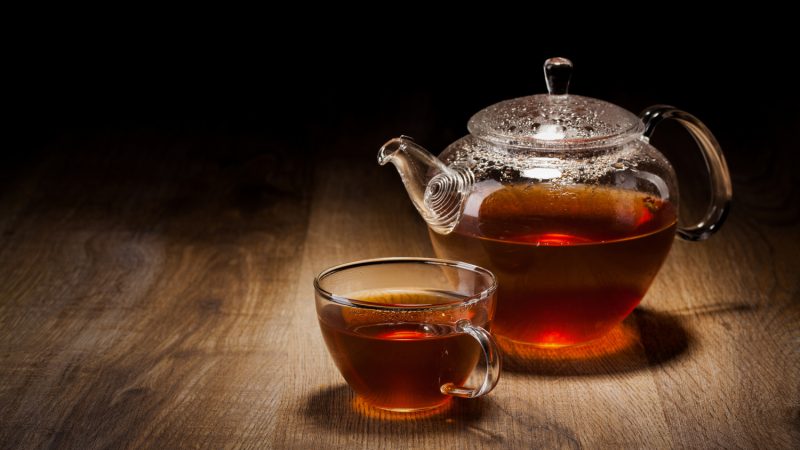
For example:
- Unlimited drinking in women after 40 years provokes the development of rheumatoid arthritis.
- Since tea contains a lot of fluoride, it can have a negative effect on the body (reduces the function of the thyroid gland, causes tooth diseases, bone disorders, impairs brain function in childhood).
- Excessive amounts of tea negatively affect the functioning of the urinary system. The kidneys are especially affected.
Contraindications to the use of strong tea:
- Hypertonic disease.
- Pregnancy and lactation.
- Childhood.
- Tendency to arthritis.
- Kidney disease.
- Lack of iodine in the body.
- Glaucoma.




